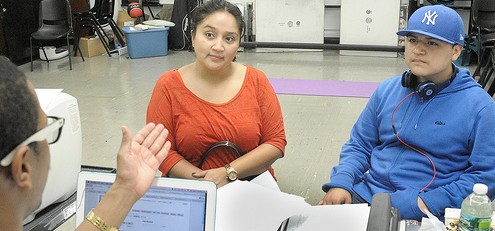Boys Need Our Help and SEL Is the Answer
By Jason Ablin

Even more worrying, the leading cause of death for boys between the ages of 11-18 is suicide, and feelings of depression and alienation skyrocketed during the pandemic, particularly for boys of color.
Middle school is where negative masculinization takes root, creating social pressures that can impair mental health and lead to marginalization and harmful misogynistic belief systems.
Richard Reeves of the Brookings Institute, in his new book Of Boys and Men, highlights many of these issues. His solutions? Boys should get more sleep or start school a year later than girls. While these suggestions are worth considering, they do not address the systemic, day-to-day social and psychological challenges that boys face.
How SEL benefits boys
Instead, we have a powerful, well-researched tool which, if fully implemented into the total package of school culture, would transform the experiences of boys and young men, namely Social Emotional Learning (SEL).
SEL normalizes students talking about their emotions and feelings of vulnerability about the many challenges – academic and social – that young people face. SEL also helps them validate their successes.
By making these conversations the currency of the entire school community, students can feel much more comfortable about issues of personal identity, and also seek help during difficult times. They learn to share reflections about the ups and downs of life in a supported environment.
Good schools incorporate SEL into their practices. Great schools make SEL the central driving mission.
Boys in particular benefit from SEL, which can help change an otherwise negative trajectory in middle school. While social norming provides many girls an accepted pathway toward relational knowledge and development, in contrast, expectations of boys “de-relationalize” them.
Dr. Niobe Way’s brilliant studies of pre-teens and teens, Deep Secrets, discovered that middle school boys have and desire strong emotional relationships with their male friends, and they understand the importance of these relationships to mental well-being.
But something happens by the time boys are 15 years old, when the forces of narrow, destructive masculine expectations solidify. Boys begin to see these earlier feelings as aligned with the feminine, and they fear being called out as girlish or even gay if they speak the language of intimacy and caring with their close friends.
“No homo” becomes the language of young men to defend their distorted senses of masculinity. Insensitivity, emotional distance. They may bully other boys who continue to use the language of caring and love and vulnerability and this response can become a reinforced, hardened layer of identity.
Involving schools and parents in SEL
With SEL, excellent social-emotional experiences driving the entire school culture are an incredibly powerful counterweight to the toxic masculinity and emotional repression that can lead to dangerous risk taking, alienation, and misogyny, encouraging sexual assault and violence. Here’s how SEL works:
At one middle school where I was principal, we turned our typical parent-teacher conferences into parent-student conferences where the kids were expected to lead the conversation. We utilized the key pillars of SEL as benchmarks of reflection: resiliency, thoughtful decision making, self-management and awareness, and social engagement.
Under the guidance of their advisors, students shared concrete examples of successes in these areas. They identified other areas where they wanted to grow. They then presented their findings to their parents. Advisors sat back and allowed the students to steer the conversation, and to articulate their feelings and thoughts about school. By doing so, they created a real dialogue with their parents or guardians concerning where they needed support.
The process was a big hit with the entire school community. Outcomes derived from student and parent surveys regarding the process included:
► Many parents of boys reported that they were communicating with their sons in much more engaged and positive ways after the evening. In other words, the conversations and benefits continued beyond that one evening.
► Boys felt heard and felt safe to express themselves in vulnerable ways.
► Parents learned specific aspects about their sons’ experiences in school that they never knew, such as which teachers they respected, what was exciting about school and how tough it was at times to navigate their days. Whether regarding academics, executive functioning skills, or social life, the conferences allowed boys to more clearly articulate where they struggled the most. Boys were able to communicate their needs in concrete ways.
► Parents also learned more about SEL and its goals, which were often mentioned by administrators in newsletters but not necessarily fully explained.
► Parents saw the benefits for their boys that will clearly pay academic and social dividends as they mature and for years to come.
One parent left the student-led conference in absolute tears. I worried that something had gone terribly wrong. But when I asked, she replied: “I haven’t heard that much of my son’s voice in an entire month.”
Integrating SEL throughout a school
Kristen Ley of Resonance Ed., a consulting firm that works with schools to properly implement SEL, reinforces the notion that SEL is not merely a program, or part of an advisory curriculum or just posters on walls. For SEL to have the enormous impact that it can have, it needs to be integrated into the very fabric of day-to-day life.
For boys, I suggest that we also be truly transparent regarding what we are trying to accomplish. Just as we need to explain how their physical bodies are changing, so we need to provide them an understanding of the various roads their emotional development, positive and negative, can take. The more they feel comfortable and supported in these conversations and engagements, the more they will see school as committed to their total well-being and success.
Read a MiddleWeb review of Jason Ablin’s
The Gender Equation in Schools

Jason currently consults with schools, leading training and workshops on gender equity, positive faculty engagement, and school culture. He lives in Los Angeles with his wife and two daughters. Visit his website.

































Spot on article that needs to be read by all! In our book, Teaching Kids to Thrive: Essential Skills for Success, Dedra Stafford and I explore this topic and give ideas on activities for helping young boys by integrating SEL skills into the regular curriculum as we as classroom routines and procedures. You can download activities for free at http://www.teachingkidstothrive.com
SEL is really helpful, especially for children and teenagers. I appreciate your efforts in implementing SEL in the schools.